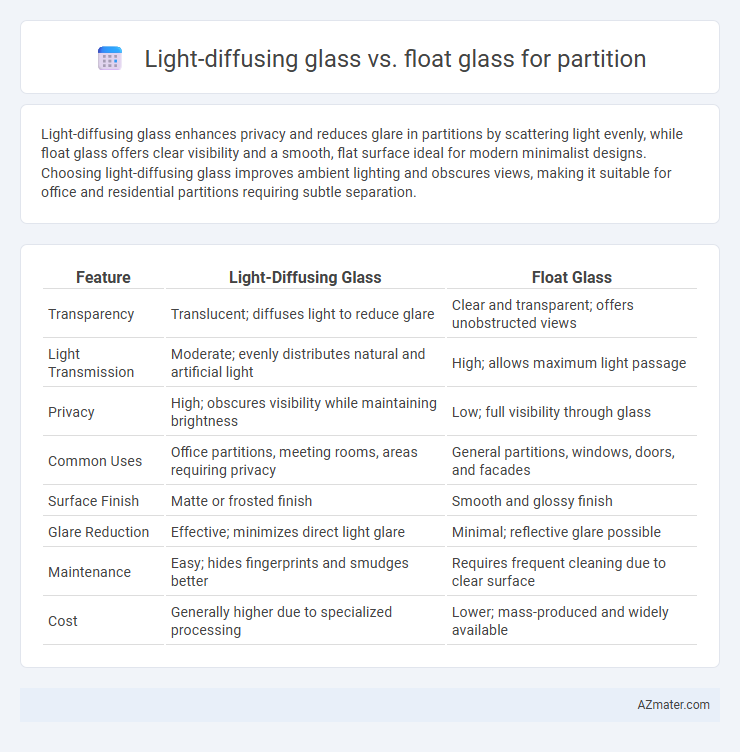Light-diffusing glass enhances privacy and reduces glare in partitions by scattering light evenly, while float glass offers clear visibility and a smooth, flat surface ideal for modern minimalist designs. Choosing light-diffusing glass improves ambient lighting and obscures views, making it suitable for office and residential partitions requiring subtle separation.
Table of Comparison
| Feature | Light-Diffusing Glass | Float Glass |
|---|---|---|
| Transparency | Translucent; diffuses light to reduce glare | Clear and transparent; offers unobstructed views |
| Light Transmission | Moderate; evenly distributes natural and artificial light | High; allows maximum light passage |
| Privacy | High; obscures visibility while maintaining brightness | Low; full visibility through glass |
| Common Uses | Office partitions, meeting rooms, areas requiring privacy | General partitions, windows, doors, and facades |
| Surface Finish | Matte or frosted finish | Smooth and glossy finish |
| Glare Reduction | Effective; minimizes direct light glare | Minimal; reflective glare possible |
| Maintenance | Easy; hides fingerprints and smudges better | Requires frequent cleaning due to clear surface |
| Cost | Generally higher due to specialized processing | Lower; mass-produced and widely available |
Introduction to Glass Partitions
Glass partitions enhance interior spaces by allowing light transmission and creating visual separation without sacrificing openness. Light-diffusing glass, designed to scatter light evenly, offers privacy and reduces glare, making it ideal for office environments and meeting rooms. Float glass provides clear transparency and smooth surfaces, perfect for spaces where unobstructed views and natural light are priorities.
What is Light-Diffusing Glass?
Light-diffusing glass is engineered to scatter incoming light, reducing glare and enhancing privacy while maintaining brightness in partition applications. Unlike float glass, which is clear and flat, light-diffusing glass contains microscopic patterns or additives that disperse light evenly across surfaces. This makes it ideal for office partitions where both natural light transmission and visual separation are required.
Understanding Float Glass
Float glass, produced by floating molten glass on a bed of molten metal, offers uniform thickness and smooth surfaces, making it a cost-effective and widely used material for partitions. Unlike light-diffusing glass, float glass is transparent and lacks the ability to scatter light, providing clear visibility but limited privacy. Understanding the fundamental properties of float glass helps in selecting the right glass type when balancing clarity, budget, and partition functionality.
Key Differences Between Light-Diffusing Glass and Float Glass
Light-diffusing glass scatters incoming light to reduce glare and enhance privacy, making it ideal for partitions in offices or healthcare settings, while float glass offers clear transparency and smoothness suitable for unobstructed views. The manufacturing process of light-diffusing glass involves adding microstructures or coatings to diffuse light, contrasted with float glass which is produced by floating molten glass on a bed of molten metal to achieve uniform thickness. Light-diffusing glass typically improves ambient lighting quality and glare control, whereas float glass prioritizes clarity and strength for versatile partition applications.
Aesthetics and Visual Appeal
Light-diffusing glass enhances partition aesthetics by scattering light uniformly, creating a soft, elegant ambiance that maintains privacy without sacrificing natural illumination. Float glass offers a clear, smooth surface ideal for sleek, modern designs but lacks the light-softening quality that adds depth and texture to interior spaces. Choosing light-diffusing glass transforms partitions into visually appealing features that balance openness and discretion effectively.
Privacy and Light Control
Light-diffusing glass offers superior privacy by scattering light to obscure visibility while allowing natural illumination, making it ideal for partitions in office and residential spaces. Float glass, being clear and transparent, provides minimal privacy but maximizes light transmission, suitable where openness and visibility are prioritized. Choosing between the two depends on the desired balance between visual privacy and light control in interior partitions.
Durability and Maintenance
Light-diffusing glass offers enhanced durability due to its textured surface that resists scratches and fingerprints better than smooth float glass, making it ideal for high-traffic partitions. Maintenance is simplified as light-diffusing glass hides smudges and dirt more effectively, reducing the frequency of cleaning required compared to float glass, which shows marks clearly. Float glass, while cost-effective and easy to clean with conventional methods, is more prone to visible wear and frequent maintenance in partition applications.
Applications in Modern Interiors
Light-diffusing glass enhances privacy and creates a soft, ambient light in modern interior partitions, making it ideal for offices, conference rooms, and residential spaces where both illumination and discretion are required. Float glass, characterized by its clear, flat surface, is commonly used in contemporary interiors for partitions that prioritize unobstructed visibility and natural light flow, such as retail spaces and open-plan offices. Selecting light-diffusing glass or float glass depends on the balance needed between transparency, light diffusion, and aesthetic appeal in specific interior design applications.
Cost Comparison and Budget Considerations
Light-diffusing glass typically costs 20-30% more than standard float glass due to specialized manufacturing processes that enhance privacy and reduce glare. Projects with tight budgets often favor float glass for partitions because it provides a cost-effective, versatile option despite lacking the light diffusion benefits. Choosing between the two depends on balancing design goals with available budget, as light-diffusing glass offers aesthetic and functional advantages at a premium price.
Choosing the Right Glass for Your Partition
Light-diffusing glass enhances privacy and softens natural light, making it ideal for office partitions where glare reduction and subtle illumination are priorities. Float glass offers clear visibility and a sleek, modern aesthetic, suitable for spaces that require transparency and a clean look. Selecting between light-diffusing and float glass depends on balancing privacy needs with design preferences and the desired level of light transmission in your partition.

Infographic: Light-diffusing glass vs Float glass for Partition
 azmater.com
azmater.com